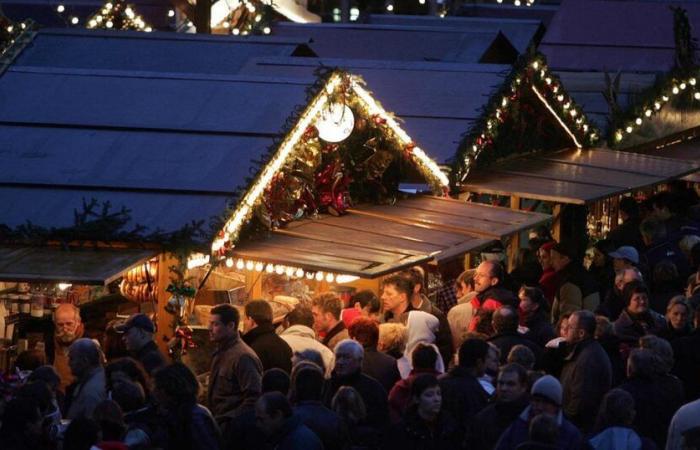In many cities in France, Christmas markets have reached new attendance records. A success that does not come without posing increasingly significant challenges for municipalities.
It is not yet time to take stock of the season and many Christmas markets will still remain open for a few more days (the one in Strasbourg will not close its doors until 9 p.m. Friday evening December 27), but already, attendance at Christmas markets in France seems to have reached records. That of Colmar saw its attendance increase by 10% compared to last year, according to Mayor Éric Straumann; that of Arras broke a record by crossing the million visitors mark; that of Strasbourg seems on track to beat the previous record of 2023 (3.3 million); that of Ribeauvillé welcomed 30,000 people every weekend… or six times more visitors than the village has inhabitants.
In Alsace or elsewhere, therefore, the Christmas markets seem to have been full for another year. If the Strasbourg Christmas market is the most legendary (and the oldest: its origin dates back to 1570!), the whole country is involved in it, and even in Provence we now meet more than 300,000 visitors in front of the chalet stalls garlanded, in Nice, Toulon or Aix-en-Provence. A growing success which the mayors are bragging about, certain to see in it proof of the attractiveness of their municipality at the time of the holidays, but which is not without posing increasingly considerable challenges to the municipalities.
Also read
In Magdeburg, contemplation and political controversy following the attack on the Christmas market
Safety first, and this was remembered as an essential requirement in the aftermath of the tragic attack in Magdeburg in Germany where 5 people died and 200 others were injured by a Saudi refugee who drove into the crowd while driving a car. a powerful SUV. If in Germany, the debate on the sufficiency or not of the security measures of the city's Christmas market is now raging, this debate has also taken place in France where several measures to strengthen the security of the Christmas markets have been decided urgently – even though they were already under close surveillance, since the attack in 2018 on the Strasbourg Christmas market.
The Alsatian prefecture had even adopted an exceptional individual surveillance system this year, extending until the end of December measures adopted this summer for the security of the Olympics: thus a Chechen refugee closely monitored by the services learned that his ban on leaving the city expressed by a Micas (individual measure of administrative control and surveillance) would continue until the end of the Christmas market, reports Challenges.
Inaccessible to people with reduced mobility
These special measures adopted by a particularly zealous prefect are in addition to those, now usual, which apply around Christmas markets everywhere else: security perimeter guarded by the police around the chalets, individual searches of pedestrians at the entry, and access prohibited to vehicles with barriers installed to stop a possible car ramming attack.
But safety is no longer the only concern of Christmas market organizers: their overcrowding creates new challenges, so that the experience remains pleasant for visitors… and is not exasperating for local residents. Thus the mayor of Ribeauvillé is thinking aloud about the idea of introducing a limitation on the number of visitors, faced with the saturation of the paths walked by a compact crowd, but also faced with the invasion of the car parks on the outskirts of the city which is no longer enough to accommodate all the vehicles.
For Strasbourg, the newspaper 20 minutes even went so far as to imagine the introduction of a toll at the entrance, as the city of Venice does, which now charges access to the city center several days a year in an attempt to regulate tourist flows. An idea, of course, very poorly received by Internet users.
Moreover, this saturation adds to an older problem, that of access to Christmas markets for people with disabilities, particularly those with reduced mobility. “Here, there is no place for us, people with disabilities” thus deplores in an interview with France 3 a Strasbourg resident in a wheelchair. “You have to slalom. There could be specific circuits. There, it's really complicated when you're in a wheelchair, like me…” The compact crowd makes wheelchair circulation almost impossible, and even more so access to the chalets; but when you finally get there, it's impossible in a wheelchair to climb high enough to see the stalls and speak to the shopkeeper… not even to mention access to the public toilets which is still an obstacle course.
“It’s not going to be cheap”
Added to these difficulties of access are others: such as the question of control exercised by municipalities over prices and the choice of goods sold on the stalls. BFM Alsace had thus noted the annoyance of many visitors at the surge in prices among certain traders, who are taking advantage of the influx of visitors to increase their prices beyond the inflation observed elsewhere on similar products. At 9€ the «baguiflette»Fanny thus testified in this report to have the impression of an expense “a little abused” – while recognizing that “when we come, we know what we’re getting into, and we fully expect that it’s not going to be cheap” : the prices are not yet dissuasive, and the desire to participate in the Christmas atmosphere that floats over the chalets is taking over.
Also read
Christmas markets tested for success
High prices are sometimes compounded by the impression that you can only buy the same trinkets from one chalet to another, or that the share left to artisans diminishes as industrial products of lower quality take over – when you can't just find food, or almost nothing. It is to combat this risk of standardization of goods or a deterioration of the spirit of the Christmas market that municipalities are sometimes tempted to sort out traders. Thus, noted the correspondent of Figaro in Alsace, in Strasbourg a decree sets out a list of items that traders can offer, a list which is intended to be “deliberately restrictive, so as to correspond as closely as possible to Christmas traditions in Alsace”. The deputy mayor Guillaume Lisbig even specifies that quality control now relies on the arbitration of the visitors themselves, who are offered to rate their experience with each of the chalets out of 100!
It remains to be seen whether the subterfuge will be enough to convince certain exasperated Strasbourg residents, who expressed to the media Pokaa their feeling that the traditional spirit of their city's Christmas market has been lost. Like Donna, who only sees one “Chinese product market” and believes that installing it at the foot of the city's cathedral “It’s like putting a circus in the Queen of England’s apartments”.






